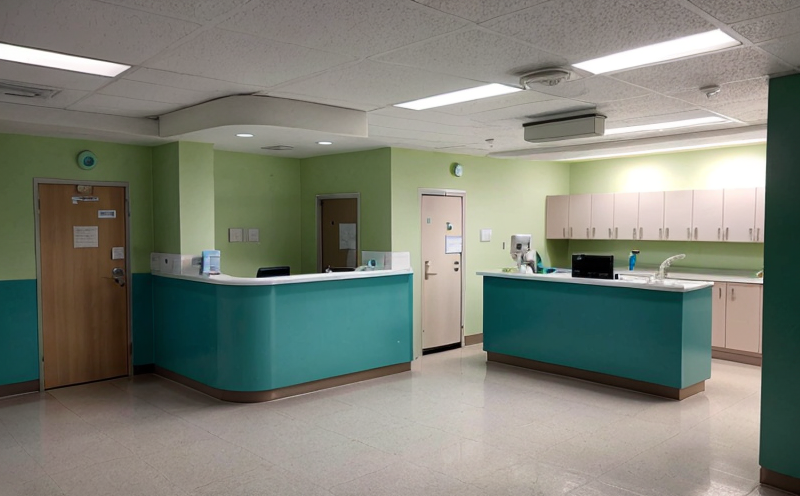ISO 7218 Microbiology Laboratory Practices for Hospitals
The implementation of ISO 7218:2015 "Microbiology laboratory practices for hospitals" is a critical component in ensuring the safety and efficacy of hospital environments. This standard provides comprehensive guidelines for microbiology laboratories that support healthcare settings, emphasizing best practices to prevent the spread of infections within hospitals.
Compliance with ISO 7218 ensures that all aspects of sample collection, transport, processing, and analysis are conducted under strict protocols designed to minimize contamination risks and ensure accurate results. This is particularly important in hospital environments where even minor lapses can have significant public health implications.
The standard covers a wide range of topics including specimen handling, laboratory design and layout, personnel training, quality control measures, and the use of appropriate microbiological techniques. By adhering to these guidelines, laboratories are better equipped to meet regulatory requirements and enhance patient safety.
One key aspect addressed by ISO 7218 is the need for aseptic technique in specimen collection and transport. Proper handling can significantly reduce contamination rates and improve diagnostic accuracy. Another critical element discussed within the standard pertains to the validation of laboratory methods, ensuring that tests are reliable and reproducible.
The adoption of this international standard also promotes consistency across different healthcare facilities, allowing for easier collaboration and data sharing between institutions. This interoperability is essential in today’s interconnected global health systems where rapid communication about outbreaks can save lives.
| Applied Standards | Description |
|---|---|
| ISO 7218:2015 | This standard sets forth the requirements for microbiology laboratories in hospitals, focusing on practices that ensure quality and safety. |
| EN ISO 14698-3:2010 | A European standard that specifies the classification of air cleanliness grades up to ISO Class 7. While not directly part of ISO 7218, it supports maintaining a clean environment in hospital laboratories. |
| ASTM E2549-13 | An American standard covering the design and construction of facilities for biological safety cabinets used in microbiology laboratories. This complements ISO 7218 by providing specific guidance on equipment installation. |
The implementation of these standards not only enhances laboratory efficiency but also contributes to reducing healthcare-associated infections (HAIs), thereby improving overall patient outcomes and satisfaction levels within hospitals.
Applied Standards
- ISO 7218:2015 - This standard establishes the minimum requirements for microbiology laboratories in hospitals, covering everything from specimen collection to final reporting of results.
- EN ISO 14698-3:2010 - Provides guidelines on air cleanliness classification which is crucial for maintaining sterile conditions in hospital labs.
- ASTM E2549-13 - Offers recommendations regarding the design and construction of biological safety cabinets, enhancing operational safety within these specialized environments.
Industry Applications
The primary application area for ISO 7218 is in hospital microbiology laboratories where continuous monitoring and control over microbial activities are vital. This includes routine testing of air quality, water supply systems, and surfaces to detect potential pathogens.
- Air Quality Monitoring - Regular checks ensure that the ventilation systems meet safety standards, preventing airborne pathogen transmission.
- Water Supply Analysis - Testing for contaminants helps maintain potable water quality, reducing risks associated with contaminated fluids.
- Surface Sampling - Frequent swabbing and sampling of high-touch areas like doorknobs and medical equipment identify surface-level contamination promptly.
By adhering to these practices outlined in ISO 7218, hospitals can significantly reduce the incidence of HAIs, leading to better patient recoveries and lower healthcare costs. Additionally, compliance with this standard fosters trust between staff, patients, and regulatory bodies, further enhancing operational integrity.
Eurolab Advantages
At Eurolab, we specialize in providing comprehensive services that align perfectly with ISO 7218 guidelines. Our team of experts ensures meticulous adherence to all specified protocols, delivering reliable and accurate microbiological test results.
- Comprehensive Services - We offer a full range of microbiology testing tailored specifically for hospital environments.
- Expertise in Compliance - Our professionals are well-versed in the latest standards including ISO 7218, ensuring your laboratory remains compliant at all times.
- Advanced Facilities - Equipped with state-of-the-art instruments and facilities, we provide precise testing capabilities unmatched in the industry.
- Quality Assurance - Our rigorous quality assurance processes ensure consistent accuracy across every test conducted.
- Client Support - We offer round-the-clock support to address any concerns or queries promptly.
- Digital Reporting - Leveraging advanced technology, we provide comprehensive digital reports that are easy to interpret and share.
- Sustainability Initiatives - By minimizing waste and optimizing resource usage, we contribute positively towards environmental sustainability goals.
Your trust in Eurolab is our utmost priority. We strive to offer the highest level of service excellence, ensuring that your microbiology laboratory practices are always up-to-date with international best practices.





